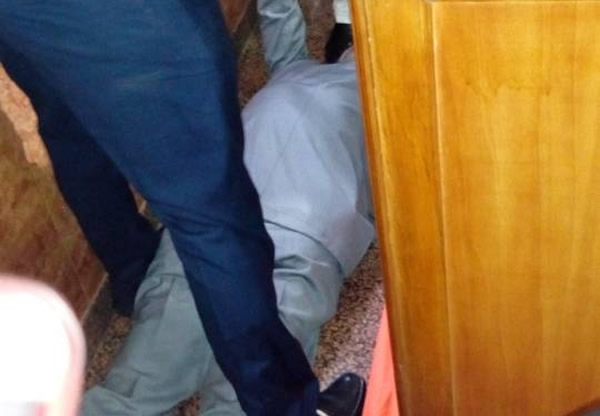Comic relief in the midst of speech tragedy swept through Nigeria last week following the leaking of a video clip in which Police Inspector General Ibrahim Idris had trouble reading his speech at an official function in Kano. The IG got stuck with the word “transmission,” repeated it many times and was unable to proceed despite the intervention of an aide who rushed in to help. The police have not flatly denied that the video was real, which is just as well because reporters were there.
They have not offered a plausible explanation either, such as that the IG had not slept well, was on medication, had read a disturbing security report, had a pre-existing medical condition, was messed up by his speech writer or even, as some people alleged, he was spiritually attacked by babalawos on the pay of Senator Dino Melaye.
At the weekend I saw many video clips, cartoons, dance dramas and t-shirts all celebrating the word “transmission.” The affair threatens to become the best public joke in Nigeria since 2016 when the social media feasted on “the other room.”
That presidential gaffe, made in Berlin while standing side by side with the austere German Chancellor Angela Merkel, created a big buzz in Nigeria for many months. “Dioder room” was the biggest hit in Nigeria since “Diaris God o!” and its corollary, “Na only you waka come?” Both historic remarks were made by then First Lady Mrs. Patience Jonathan, who was gamely trying to prove that the Chibok girls’ abduction of 2014 was a political plot against her husband.
Advertisement
Diaris God o!, which is still a hit in Nigeria, completely dwarfed the previous champion, “Oga at the Top.” An officer of the Nigeria Security and Civil Defence Corps said in a television interview that he did not know the full web address of his organization but that his “Oga at the Top,” i.e. the Commandant General, will know the address. Within days Oga at the Top T-shirts were selling like hot cakes. Yaliam Press of Abuja cashed in on it with a full-page newspaper ad showing the company’s chairman clutching a phone and sitting on top of their tall factory building with the legend, “You can speak to our Oga at the Top.”
That episode was an image disaster for NSCDC but it was welcome relief for then President Goodluck Jonathan because it replaced the public feasting on his live television remark that “ordinary stealing, people say it is corruption.” Political opponents and media commentators jumped on the statement, as did comedians, cartoonists and social media wags.
Jonathan’s subsequent explanation that it was the Chief Justice of Nigeria that said so in a private meeting did not quench the fire, until Oga at the Top came along.
Advertisement
Before that, the reigning presidential gaffe dating back to 2007 was President Obasanjo’s “Umoru! Are you dead?” It was the ultimate show of presidential desperation. The ruling party’s presidential candidate, always rumoured to be in poor health, had collapsed during the campaign and was rushed abroad. Obasanjo, who single-handedly anointed him, whipped out a phone during a campaign rally broadc
Not long afterwards, Obasanjo released another cat among the pigeons when he said if indeed he had wanted a third term in office, “I would have prayed to God and He would have given it to me. God has given me everything I asked for.” Columnists and comedians feasted on that; no one else in the history of Nigerian gaffes had ever claimed that God gave him a blank cheque of worldly wishes. Four years earlier in 2003, when GSM phones were new in Nigeria, text messages swamped the country saying the Esama of Benin Chief Gabriel Igbinedeon made a controversial remark at his son, Edo State Governor Lucky Igbinedion’s re-election campaign rally. Esama allegedly said, “People say Lucky fail, Lucky fail! You, if your son fail in school, will he not repeat?” There were no smart phones then so I never saw a video clip of that alleged gaffe, if it happened.
To find a public officer’s remark that similarly engulfed the country we must go back to 1998, when the Abacha regime violently put down a riot on Ibadan streets. Oyo State’s Military Administrator Colonel Ahmed Usman then said, “All those who were captured” [hundreds of arrested rioters] “will be held as Prisoners of War.” The statement shocked the media and the political class; it was the first time we heard of POWs since the civil war ended in 1970. Ten years before Ahmed Usman, a military Minister of Communications [name withheld] was widely quoted to have said that “telephones are not for the poor.” He allegedly said so in response to complaints that NITEL’s telephone bills were outrageous and that too few Nigerians had telephone landlines.
He was not the only soldier that made a shocking statement. In 1988 when the Babangida regime deported Ahmadu Bello University don Professor Patrick Wilmot, Military Governor of Niger State Colonel Lawan Gwadabe responded to the national uproar by saying Wilmot was not a Nigerian and government could deport even a Nigerian citizen if he crossed its path. His remark caused shell shock in the media.
Advertisement
Where the soldiers gripped national discourse with tragic remarks, politicians provided comic relief. Oyo State PDP chieftain Chief Sunday Afolabi, unhappy that Obasanjo brought AD chieftain Chief Bola Ige into his cabinet as Power Minister and later Attorney General, said Bola Ige was “only invited to come and eat” because he did not work for PDP’s election victory. A few years earlier, during the Abacha era, powerful Ibadan kingmaker Alhaji Lamidi Adedibu had a feisty interview with a reporter who asked him if it was true that he was the master of Amala politics. Adedibu said, “It is true. Whoever comes to this house, he must eat and when he is going, I must give him money. Even you, when you finish this interview, I am going to give you money.”
To find a comparably gripping political statement, we must go back to the Second Republic when an FRCN Kaduna reporter asked Gongola State Governor Abubakar Barde if it was true he had acquired many houses. Barde said, “If I have any houses in this world apart from ten, may Allah not give me what I am looking for.” To which the redoubtable political program anchor Halilu Ahmed Getso quickly said, “Ba amin ba!” [Not amen!]
Around the same time during the 1983 election campaign, Alhaji Abubakar Rimi appeared at an NPP campaign rally with Anambra State governor Jim Nwobodo, both of them wearing Dr. Nnamdi Azikiwe-style neck beads. Rimi then boasted that NPP would sweep the election because Nigerian women will vote for the party because of his and Nwobodo’s handsome faces.
The other source of comic relief in Nigeria until 1997 was music legend Fela Anikulapo-Kuti. Fela had a monumental clash with NDLEA’s tough as doornails chairman Major General Musa Bamaiyi in 1996. NDLEA raided Kalakuta Republic and seized huge quantities of Indian hemp. When he was released, Fela called on Abacha to sack Bamaiyi because he did not know the meaning of drugs. “Indian hemp is not a drug,” Fela said. “It is a herb.”
Advertisement
In the 1990s Fela was given an award at a music festival but since he did not bother to attend, Ben Murray Bruce collected it on his behalf. A reporter then rushed to Kalakuta Republic and told Fela that Bruce represented him and collected theaward. To which Fela said, “How can an oyinbo represent an African?”
This article first appeared in Daily Trust
Advertisement
Add a comment







